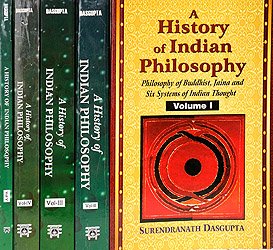A History of Indian Philosophy Volume 2
by Surendranath Dasgupta | 1932 | 241,887 words | ISBN-13: 9788120804081
This page describes the philosophy of analysis of action: a concept having historical value dating from ancient India. This is the ninth part in the series called the “the philosophy of the bhagavad-gita”, originally composed by Surendranath Dasgupta in the early 20th century.
Part 9 - Analysis of Action
The consideration of the Gītā ethics naturally brings in the problem of the analysis of the nature of action, volition and agent. The principal analysis of volition in Hindu Philosophy is to be found in the Nyāya-Vaiśeṣika works. Praśastapāda divides animal activities into two classes, firstly, those that are of a reflex nature and originate automatically from life-functions (jīvana-pūrvaka) and subserve useful ends (kārn api artha-kriyām) for the organism, and, secondly, those conscious and voluntary actions that proceed out of desire or aversion, for the attainment of desirable ends and the avoidance of undesirable ones. Prabhākara holds that volitional actions depend on several factors, firstly, a general notion that something has to be done (kāryatā-jñāna), which Gaṅgabhaṭṭa in his Bhātta-cintāmaṇi explains as meaning not merely a general notion that a particular work can be done by the agent, but also the specific notion that an action must be done by him—a sense which can proceed only from a belief that the action would be useful to him and would not be sufficiently harmful to him to dissuade him from it.
Secondly, there must be the belief that the agent has the power or capacity of performing the action (kṛti-sādhyatā-jñāna). This belief of kṛti-sādhyatā-jñāna leads to desire (cikīrṣā). The Prabhākaras do not introduce here the important factor that an action can be desired only if it is conducive to the good of the agent. Instead of this element they suppose that actions are desired when the agent identifies himself with the action as one to be accomplished by him—an action is desired only as a kind of selfrealization. The Nyāya, however, thinks that the fact that an action is conducive to good and not productive of serious mischief is an essential condition of its performance.
The Gītā seems to hold that everywhere actions are always being performed by the guṇas or characteristic qualities of prakṛti , the primal matter. It is through ignorance and false pride that one thinks himself to be the agent[1]. In another place it is said that for the occurrence of an action there are five causes, viz. the body, the agent, the various sense-organs, the various life-functions and biomotor activities, and the unknown objective causal elements or the all-controlling power of God (daiva)[2]. All actions being due to the combined operation of these five elements, it would be wrong to think the self or the agent to be the only performer of actions. Thus it is said that, this being so, he who thinks the self alone to be the agent of actions, this wicked-minded person through his misapplied intelligence does not see things properly[3]. Whatever actions are performed, right or wrong, whether in body, speech or mind, have these five factors as their causes[4].
The philosophy that underlies the ethical position of the Gītā consists in the fact that, in reality, actions are made to happen primarily through the movement of the characteristic qualities of prakṛti , and secondarily, through the collocation of the five factors mentioned, among which the self is but one factor only. It is, therefore, sheer egoism to think that one can, at his own sweet will, undertake a work or cease from doing works. For the prakṛti , or primal matter, through its later evolutes, the collocation of causes, would of itself move us to act, and even in spite of the opposition of our will we are led to perform the very action which we did not want to perform. So Kṛṣṇa says to Arjuna that the egoism through which you would say that you would not fight is mere false vanity, since the prakṛti is bound to lead you to action[5]. A man is bound by the active tendencies or actions which necessarily follow directly from his own nature, and there is no escape. He has to work in spite of the opposition of his will.
Prakṛti, or the collocation of the five factors, moves us to work. That being so, no one can renounce all actions. If renouncing actions is an impossibility, and if one is bound to act, it is but proper that one should perform one’s normal duties. There are no duties and no actions which are absolutely faultless, absolutely above all criticism; so the proper way in which a man should purify his actions is by purging his mind of all imperfections and impurities of desires and attachment. But a question may arise how, if all actions follow necessarily as the product of the five-fold collocation, a person can determine his actions? The general implication of the Gītā seems to be that, though the action follows necessarily as the product of the fivefold collocation, yet the self can give a direction to these actions; if a man wishes to dissociate himself from all attachments and desires by dedicating the fruits of all his actions to God and clings to God with such a purpose, God helps him to attain his noble aim.
Footnotes and references:
[1]:
Gītā, iii. 27 ; xm. 29.
[2]:
adhiṣṭhānaṃ tathā kartā karaṇaṃ ca pṛthag-vidham
vividhāś ca pṛthak ceṣṭā daivaṃ caivātra pañcamant.
Ibid. xviii. 14.
[3]:
Gītā, XVIII. 16.
[4]:
Ibid. XVIII. 15.
[5]:
Ibid. XVIII. 59.
